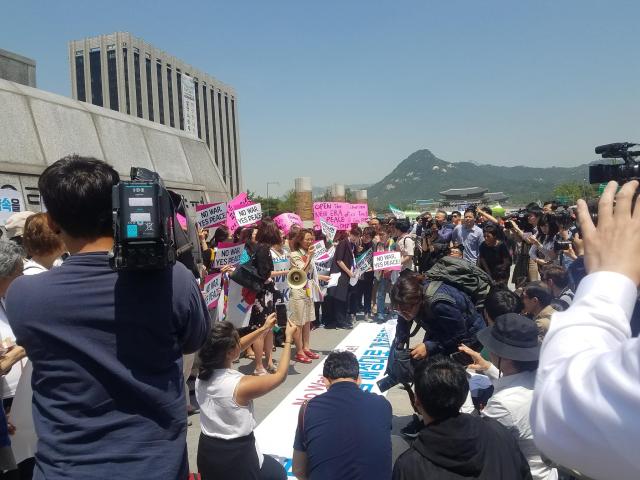But women say peace in Korea is unstoppable.

“Today, 80 million hearts across the peninsula are broken.”
That was the reaction of Korean partners, representing Women’s Peace Walk, a coalition of more than 30 South Korean women’s peace organizations to the shocking news of the American cancellation of the June 12 summit planned between U.S. President Trump and Chairman Kim Jong Un of North Korea.
But together, we lost no time in declaring that the momentum toward peace is unstoppable, driven forward by the deep yearning of the Korean people for reconciliation and peace after 70 years of separation and conflict.
At a quickly called press conference in Gwangwamun Square, in the centre of Seoul and in front of the United States embassy, Christine Ahn, founder of Women Cross DMZ, declared: “Peace isn’t just up to two men. It’s up to the people and the leaders of North and South Korea, and that peace train has long left the station.”
This week I am in Seoul representing the United Church as part of an international delegation of 30 peace activists, security experts, and civil society leaders. Led by Nobel Peace laureate Mairead Maguire, brought together by WomenCrossDMZ, and the Nobel Peace Initiative, we are here in solidarity with the Women’s Peace Walk coalition, which includes United Church partner the National Council of Churches in Korea. The stated purpose of our delegation was to listen and learn from women in South Korea, to better support their efforts for genuine peace on the Korean peninsula, strategize together, and continue to build a global feminist peace movement.
President Trump’s May 24 announcement changed all that. Earlier that day, we had been meeting at the Korean National Assembly, for an International Women’s Peace Symposium. Our jam-packed day, full of discussion from varied global perspectives, had been hosted by Chung Hyun-back, Korean Minister of Gender Equality and Family. Minister Chung had opened the symposium that morning, saying, “We are standing at the crossroads of peace—it will come, but it won’t come easily and it won’t be free.”
The next day, as we stood in Gwangwamun Square, her words rang in my ears. The deeply disappointing announcement from President Trump brings into even sharper focus the importance of women’s participation in the peace process and that the only outcome must be a diplomatic one.
Nobel Peace Laureate Mairead Maguire of Northern Ireland called for the United States and North Korea to return to the peace table.
“Every day you hesitate, someone dies and will not get a chance to be reunited and to see their families,” said Maguire. “I say to President Trump and Chairman Kim: be courageous and sit down and work for peace and reunification for Korean families and the Korean peninsula.”
We called for June 12 to be a Global Day of Solidarity with the Korean people for peace. We called for President Moon and Chairman Kim to go ahead and meet on June 12 and to fulfill the commitments outlined in the April 27 Panmunjeom Declaration, including resuming talks on the political and military levels. Korean partners told us that a hot-line phone exists between North and South Korea: “They should pick up the phone and use it.”
A return to a rhetoric of nuclear annihilation and destruction is unacceptable. The people of both North and South Korea, and especially women, have worked too long and have come too close to see the talks collapse. Everyone around the world wants this peace process to succeed.
At the symposium on May 24, we named the critical moment in Korea, and the widely held hope that the “upcoming talks” would be successful in leading to peace on the Korean Peninsula and around the world.
The “talks” that lie ahead may be inter-Korean ones, rather than between the U.S. and North Korea. And those—we pray—may be more effective in leading the Korean people and the world away from war and toward peace.
On May 26, our delegation joins with civil society for a peace walk in the south Korean city of Paju, close to the demilitarized zone separating North and South Korea. We will bear witness to our commitment that “Peace can only be achieved through means that reject violence. We … will continue our movement for peace until the threat of war disappears from the earth. We hope that all citizens of both South and North Korea, as well as all the peace-loving citizens around the world, will join us on the path to create a peace treaty to formally end the Korean War. This is an important first step to building peace and genuine security for Korea and for the world” (2018 International Women Peace Walk Declaration).
—Patti Talbot leads the Global Partnership staff team in the General Council’s Church in Mission Unit.